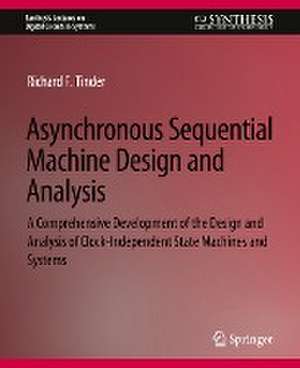Asynchronous Sequential Machine Design and Analysis: A Comprehensive Development of the Design and Analysis of Clock-Independent State Machines and Systems: Synthesis Lectures on Digital Circuits & Systems
Autor Richard Tinderen Limba Engleză Paperback – 25 dec 2008
Din seria Synthesis Lectures on Digital Circuits & Systems
-
 Preț: 391.61 lei
Preț: 391.61 lei -
 Preț: 464.75 lei
Preț: 464.75 lei -
 Preț: 353.86 lei
Preț: 353.86 lei -
 Preț: 382.95 lei
Preț: 382.95 lei -
 Preț: 279.80 lei
Preț: 279.80 lei -
 Preț: 234.87 lei
Preț: 234.87 lei -
 Preț: 317.52 lei
Preț: 317.52 lei -
 Preț: 191.30 lei
Preț: 191.30 lei -
 Preț: 279.80 lei
Preț: 279.80 lei -
 Preț: 279.80 lei
Preț: 279.80 lei -
 Preț: 234.87 lei
Preț: 234.87 lei - 19%
 Preț: 460.90 lei
Preț: 460.90 lei -
 Preț: 279.80 lei
Preț: 279.80 lei -
 Preț: 265.18 lei
Preț: 265.18 lei -
 Preț: 234.87 lei
Preț: 234.87 lei -
 Preț: 234.87 lei
Preț: 234.87 lei -
 Preț: 267.31 lei
Preț: 267.31 lei -
 Preț: 247.72 lei
Preț: 247.72 lei -
 Preț: 351.41 lei
Preț: 351.41 lei - 15%
 Preț: 548.10 lei
Preț: 548.10 lei -
 Preț: 416.01 lei
Preț: 416.01 lei -
 Preț: 351.41 lei
Preț: 351.41 lei -
 Preț: 191.30 lei
Preț: 191.30 lei -
 Preț: 383.71 lei
Preț: 383.71 lei -
 Preț: 191.30 lei
Preț: 191.30 lei -
 Preț: 264.20 lei
Preț: 264.20 lei -
 Preț: 191.30 lei
Preț: 191.30 lei -
 Preț: 234.87 lei
Preț: 234.87 lei -
 Preț: 279.80 lei
Preț: 279.80 lei -
 Preț: 454.53 lei
Preț: 454.53 lei -
 Preț: 234.87 lei
Preț: 234.87 lei -
 Preț: 429.59 lei
Preț: 429.59 lei -
 Preț: 234.87 lei
Preț: 234.87 lei -
 Preț: 234.87 lei
Preț: 234.87 lei -
 Preț: 247.72 lei
Preț: 247.72 lei -
 Preț: 351.41 lei
Preț: 351.41 lei -
 Preț: 450.71 lei
Preț: 450.71 lei -
 Preț: 191.30 lei
Preț: 191.30 lei -
 Preț: 383.71 lei
Preț: 383.71 lei -
 Preț: 191.30 lei
Preț: 191.30 lei -
 Preț: 234.87 lei
Preț: 234.87 lei -
 Preț: 191.30 lei
Preț: 191.30 lei -
 Preț: 264.41 lei
Preț: 264.41 lei -
 Preț: 279.80 lei
Preț: 279.80 lei
Preț: 279.80 lei
Nou
Puncte Express: 420
Preț estimativ în valută:
53.55€ • 55.70$ • 44.88£
53.55€ • 55.70$ • 44.88£
Carte tipărită la comandă
Livrare economică 10-15 martie
Preluare comenzi: 021 569.72.76
Specificații
ISBN-13: 9783031797873
ISBN-10: 3031797876
Ilustrații: XV, 235 p.
Dimensiuni: 191 x 235 mm
Editura: Springer International Publishing
Colecția Springer
Seria Synthesis Lectures on Digital Circuits & Systems
Locul publicării:Cham, Switzerland
ISBN-10: 3031797876
Ilustrații: XV, 235 p.
Dimensiuni: 191 x 235 mm
Editura: Springer International Publishing
Colecția Springer
Seria Synthesis Lectures on Digital Circuits & Systems
Locul publicării:Cham, Switzerland
Cuprins
I: Background Fundamentals for Design and Analysis of Asynchronous State Machines.- Introduction and Background.- Simple FSM Design and Initialization.- Detection and Elimination of Timing Defects in Asynchronous FSMs.- Design of Single Transition Time Machines.- Design of One-Hot Asynchronous FSMs.- Design of Pulse Mode FSMs.- Analysis of Asynchronous FSMs.- II: Self-Timed Systems/ Programmable Sequencers, and Arbiters.- Externally Asynchronous/Internally Clocked Systems.- Cascadable Asynchronous Programmable Sequencers (CAPS) and Time-Shared System Design.- Asynchronous One-Hot Programmable Sequencer Systems.- Arbiter Modules.
Notă biografică
Professor Richard Tinders teaching interests have been highly varied over his tenure at Washington State University (WSU). They have included crystallography, thermodynamics of solids (both equilibrium and irreversible thermodynamics), solid state electronics, tensor properties of crystals, dislocation theory, solid state direct energy conversion (mainly solar cell theory, thermoelectric effects, and fuel cells), general materials science, electromagnetics, and analog and digital circuit theory. For more than 20 years, he taught logic design at the entry, intermediate, and advanced levels and has published a major text in the area titled Engineering Digital Design, 2nd Ed. Revised. He has conducted research and published in the areas of tensor properties of solids, surface physics, shock dynamics of solids, milli-micro plastic flow in metallic single crystals, high-speed asynchronous (clock-independent) state machine design, and Boolean algebra (specifically XOR algebra and graphics). Recently, he has published two books: Relativistic Flight Mechanics and Space Travel and Tensor Properties of Solids - Phenomenological Development of the Tensor Properties of Crystals. Professor Tinder received his bachelors, masters, and doctoral degrees from the University of California, Berkeley. In the early 1970s, he spent one year as a visiting faculty member at the University of California, Davis, in what was then the Department of Mechanical Engineering and Materials Science. There, he continued teaching materials science including solid state thermodynamics and advanced reaction kinetics. Following his return to WSU, he taught logic design and conducted research in that area until retirement in 2004. Currently, he is Professor Emeritus of the School of Electrical Engineering and Computer Science at WSU.
